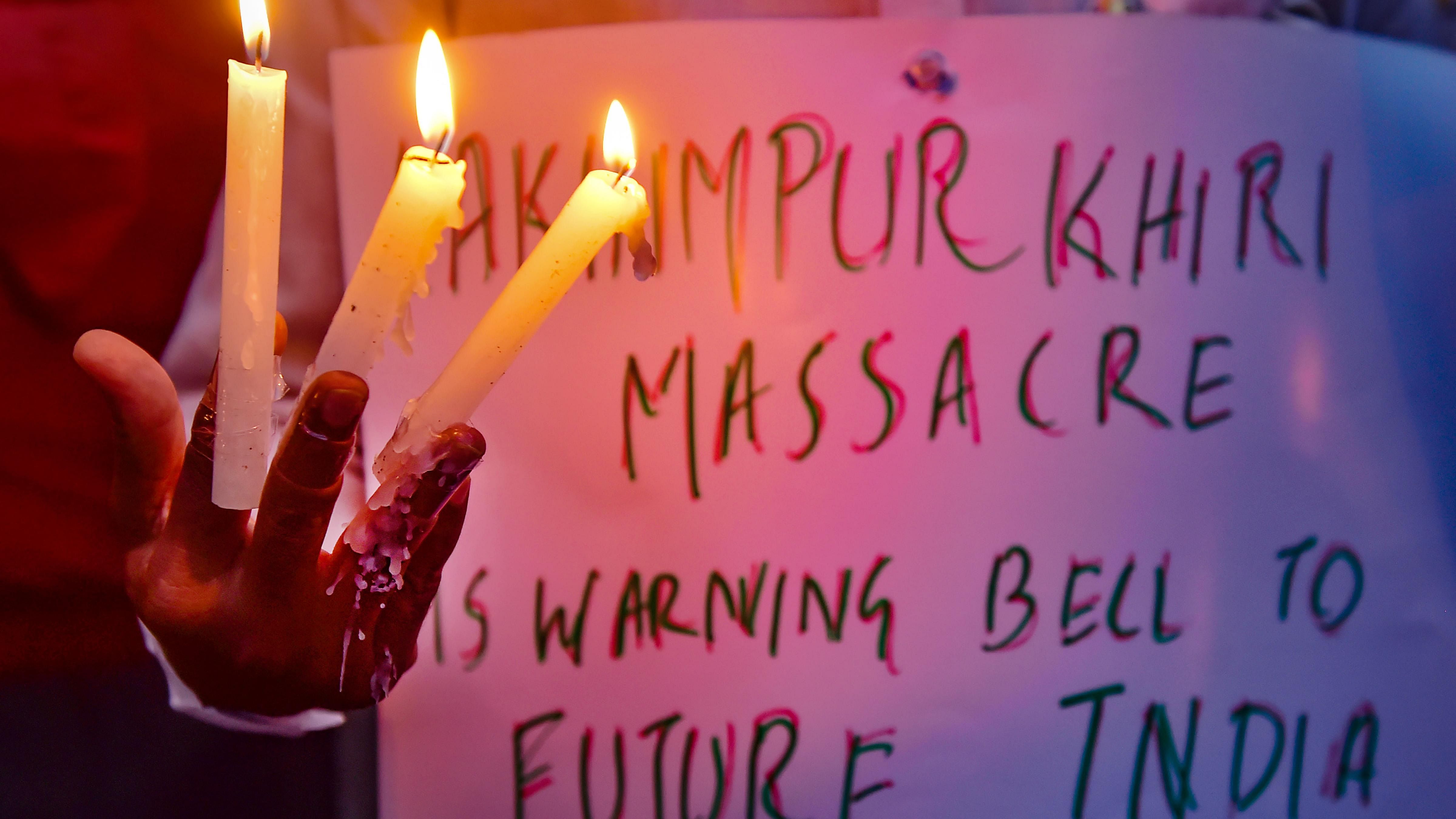
Shubham Mishra, a Bharatiya Janata Party (BJP) booth president in Lakhimpur Kheri, was in the back seat of the vehicle which ran over farmers on October 3, killing four of them. While the vehicle's other occupants, including reportedly, Central minister Ajay Mishra's son Ashish Mishra, escaped, Shubham was among the three lynched by the enraged farmers.
Does Shubham's family deserve sympathy for having lost their 29-year-old son in this manner? Does his wife - left with a year-old daughter - need to know that those involved in the conflict that claimed her husband's life are sorry about how her husband died? Or does this family - also farmers - become untouchable because their son was a BJP member who travelled in the killer vehicle, thereby indistinguishable from those who decided to mow down the protesting farmers?
It's not an easy question, especially if you support the farmers' protest. So before visiting Shubham's family to offer condolences, should Yogendra Yadav have taken permission from the Samyukta Kisan Morcha?
As punishment for this visit, the Morcha suspended Yadav, its core committee member, for a month and asked for a public apology. Yadav apologized for not informing or consulting them, but not for the visit, because he maintained, "You cannot be partisan about grief."
But being partisan about grief is what sustains our politics. Priyanka Gandhi's visit to the family of a farmer who was mowed down was televised nationwide. She also visited the family of journalist Raman Kashyap, killed in the incident. But she did not visit Shubham's family because the police told her they didn't want to meet her, she claimed.
This leader who chose to believe the police – was she the same leader whose fiery confrontation with the UP police when stopped from going to Lakhimpur Kheri went viral? Priyanka Gandhi could get no one from her party, no journalist from the many openly supportive of her, to check with Shubham's family? At any rate, his family denied having spoken to any policeman about Priyanka's intended visit.
Twenty years ago, what stopped Sonia Gandhi, who was leading a team of 18 MPs to Gujarat in the wake of the 2002 violence, from meeting the families of the 59 burnt alive in the Sabarmati Express' S6 coach at Godhra? Forget the Congress president; not even Gujarat's NGOs bothered to inquire about these families. Had they done so, they would have realized that most of those who died were not Vishva Hindu Parishad (VHP) fanatics but just ordinary Hindus: retirees and housewives for whom the VHP's Ayodhya journey was a tempting opportunity to go on a pilgrimage where all arrangements had been taken care of.
As it turned out, because of their boycott by secularists, the VHP remained the only contact through whom I could trace them out even a month after the train was burnt; the only group they could turn to. Yet, even in the presence of VHP members, most of them strongly decried the revenge that was being meted out on Muslims in their name.
Leave aside the questionable ethics of seeing victims of mob violence as "our victims, your victims" (to quote Yadav). What about the damage done by such politics? Isn't it clear as day that such one-sided sharing of grief only drives victims into the arms of those claiming to represent them based on their identity alone, who see them as faceless victims whose tragedy must be exploited? Significantly, though then Gujarat CM Narendra Modi used the train burning to justify the anti-Muslim pogrom that followed: "a chain of action and reaction is going on", even he did not visit the families of the Sabarmati victims.
Revisiting these families a decade later, I found that the VHP had, after milking the train burning incident to the maximum, abandoned them. This brought to mind the revelation by the Hindus who'd moved out of their Muslim neighbourhood after the Radhabai Chawl incident (in which six Hindus were burnt alive during the Mumbai 92-93 riots): it was Congress MP and alleged "Muslim-lover" Sunil Dutt who'd facilitated their resettlement in a Hindu area nearby. The Shiv Sena, who exploited the Radhabai Chawl incident to organize a "Hindu backlash" against innocent Muslims (as per the Srikrishna Commission Report), only contacted these Hindus when they needed to parade them as "Hindu victims" in front of dignitaries.
But who knew? The Sena still claims it "saved Hindus" during the riots; the world still believes this.
The Kisan Morcha would never have allowed Yogendra Yadav to visit Shubham's family. Unlike Sunil Dutt's good deed, today's media-driven times will not, fortunately, allow Yadav's brave gesture to remain unknown.
(The writer is a journalist)
Disclaimer: The views expressed above are the author's own. They do not necessarily reflect the views of DH.